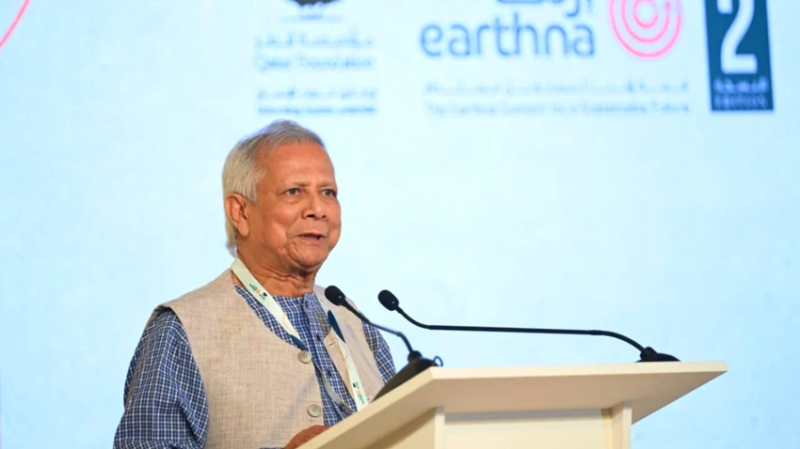- Fakhrul condemns attacks on media, calls for unity, justice |
- 2 cops among 4 hurt in clash outside Indian Assit H.C. in Ctg |
- Inqilab Moncho urges people to avoid violence |
- Hadi’s death: Prothom Alo, Daily Star offices set afire |
- সন্ধ্যায় পৌঁছাবে হাদির মরদেহ, জানাজা শনিবার |
Social Business Can Lift Millions Out of Poverty: Prof Yunus

Chief Adviser Professor Muhammad Yunus has said poverty is not caused by the poor themselves but by flawed economic systems that allow wealth to accumulate at the top. Speaking at the Earthna Summit 2025 in Doha, the Nobel Laureate highlighted the transformative power of social business and microfinance in eradicating poverty and advancing sustainable development.
“Poverty is not created by poor people,” Prof Yunus told the summit, hosted by Qatar Foundation. “It is the result of an economic structure where resources consistently flow upwards, concentrating wealth in fewer hands.”
Delivering the keynote on “Exploring the role of social business, financial inclusion, and microfinance in fostering sustainable development and economic opportunities for marginalised communities,” Yunus outlined how these models have successfully changed lives in Bangladesh and around the world.
He stressed that social business, when combined with financial inclusion, can break the cycle of poverty. “From my own experiences, I’ve seen how social business and microcredit can empower marginalised communities. These two approaches are deeply interlinked and have uplifted millions.”
In Bangladesh, he said, microcredit has proven that even the poorest are bankable. Grameen Bank, founded by Yunus, pioneered the model of collateral-free, small loans—primarily for women—enabling them to launch microenterprises and improve their quality of life.
“Grameen Bank disburses over US$2.5 billion annually to 9 million women, with an impressive 99% repayment rate,” he noted. Globally, more than 300 million people have benefited from microcredit programmes.
He also pointed to Grameen America’s achievements, which include more than US$600 million in loans to over 86,000 low-income women in the United States, also maintaining a repayment rate above 99%.
Yunus shared moving stories, including Damaris, who expanded her restaurant in Boston, and Reyna, who scaled her boutique business in Texas—showcasing how access to finance transforms lives. He also praised Kiva, a digital platform that has enabled over US$960 million in loans across 82 countries.
Turning to social business ventures, he cited Grameen Danone Foods, which produces fortified yogurt to combat child malnutrition in Bangladesh, and Grameen Euglena, which creates nutritious cookies while supporting local farmers. Internationally, he mentioned Golden Bees in Uganda, Impact Water in schools, and Japan’s Human Harbor Corporation, which recycles waste and employs former prisoners.
“The growing number of social business funds and the increasing interest from young people and global corporations show this model’s rising relevance and impact,” Yunus said.
He reaffirmed his vision for a world with three zeroes: zero poverty, zero unemployment, and zero net carbon emissions—and added a fourth: zero waste. “This isn’t a fantasy. It’s a vision rooted in lived experience,” he said.
Yunus explained that zero waste goes beyond an ideology—it’s a practical framework involving design, reuse, recycling, and composting to eliminate waste and foster ethical consumption and sustainable production.
He also emphasised the value of traditional knowledge in achieving sustainability. “Often, traditional practices offer the most effective solutions to modern challenges. We must build on them to ensure genuine, lasting development,” he said.
The event was attended by Sheikha Moza bint Nasser, Chairperson of Qatar Foundation, and Sheikha Hind bint Hamad Al Thani, Vice Chairperson and CEO, along with global leaders and policymakers.

